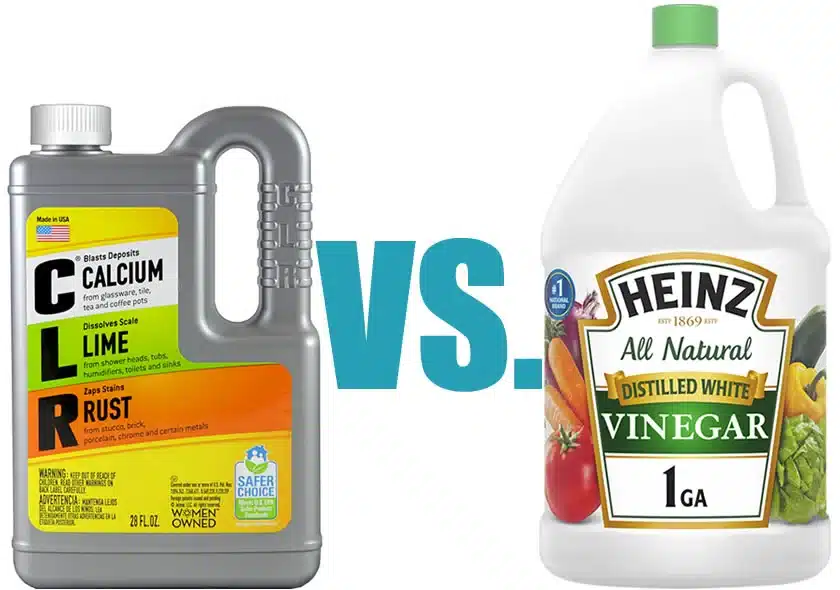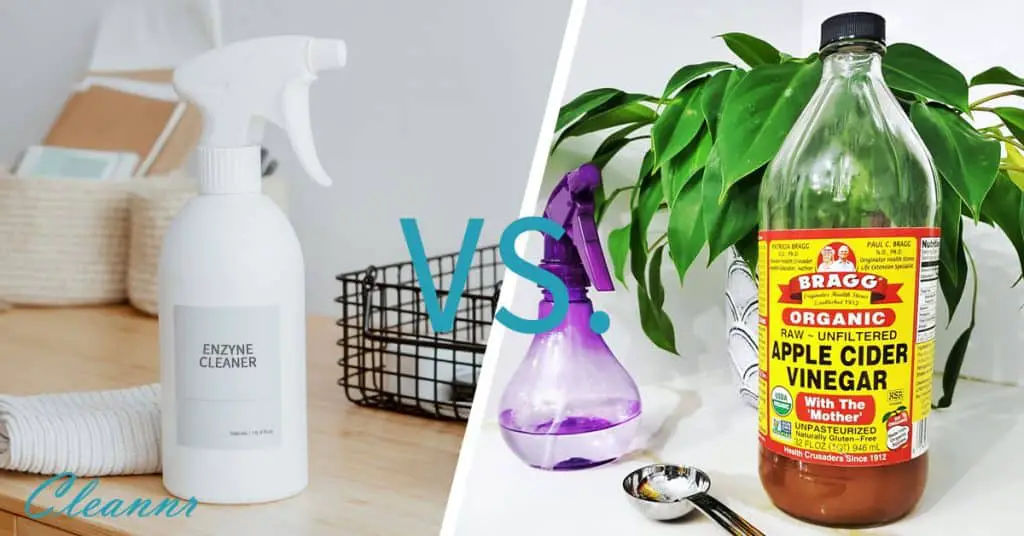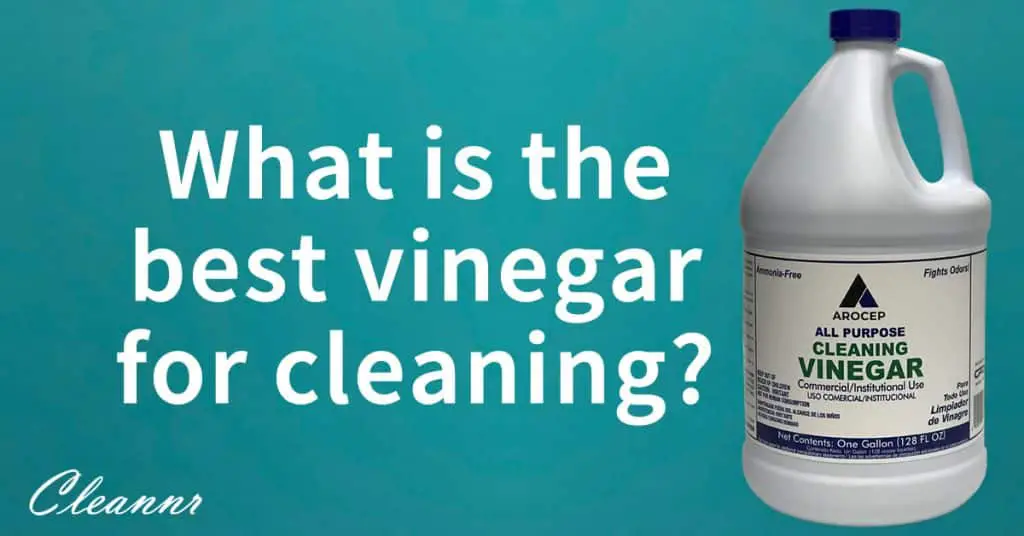When it comes to cleaning stubborn stains, many people have a dilemma: CLR vs vinegar? That’s the question I asked myself for a while. Both of them are meant to deep clean our hard surfaces and make them shiny, clean, and complete. But which one is better?
The answer lies in the type of stain you’re dealing with. Vinegar is better for everyday dirt, while CLR works best on soap scum. But if you have issues with rust and hard water stains, you might want to reach for that bottle of CLR first!
CLR and vinegar are both used for cleaning different types of stains. But which one is better for each use? That’s what I want to look at in this article. So, let’s go together through this article and find the best way to clean our surfaces!
Contents
- CLR vs Vinegar: Does CLR work better than vinegar?
- What is CLR made of?
- Is CLR better than vinegar?
- Can you mix CLR and vinegar?
- What happens when you mix CLR and vinegar?
- CLR or vinegar for the water heater
- CLR or vinegar for shower head
- CLR or vinegar to clean the washing machine
- CLR vs vinegar dishwasher
- CLR vs vinegar rust
- CLR vs vinegar toilet
- Clean coffee pot with CLR
- What should you not use CLR on?
- Is CLR dangerous?
- Is CLR safe to breathe?
- FAQs
- Final word
CLR vs Vinegar: Does CLR work better than vinegar?

CLR and vinegar have both been used in home cleaning for years. Both products contain acetic acid, which is a chemical compound commonly found in vinegar.
They can be used to remove mineral deposits from sinks, tubs, and other surfaces around the house.
If you’re looking for a way to get rid of soap scum or hard water stains, these products are great choices for cleaning your home. But which one should you use?
Here’s what you need to know about CLR vs vinegar:
- Both products work well at removing hard water stains from your bathroom fixtures and sinks. They can also help unclog drains by removing calcium buildup in pipes.
- Vinegar has an acidic pH level that can corrode metal surfaces if it comes into contact with them; this is why it’s important to wear gloves while using it to clean toilets!
- CLR has a neutral pH level that won’t corrode metal surfaces when used as directed (it may leave white residue on grout lines), so it’s safe to use without gloves if desired.
What is CLR made of?
So, what is CLR made of? The main ingredients in CLR are sodium percarbonate and hydrogen peroxide.
Sodium percarbonate is used as an alternative to chlorine bleach, which is known to be harmful to the environment.
Hydrogen peroxide is a powerful oxidizing agent that breaks down organic materials that cause stains.
Together, these two ingredients create a powerful cleanser able to break down tough stains on your tubs, sinks, toilets, grout lines, and chrome fixtures.
Is CLR better than vinegar?
If you want to know if is CLR better than vinegar, it’s important to know exactly what kind of job you want your cleaner to do!
If you’re looking for a solution that will help you remove hard water stains from your sink, tub, or shower, then CLR is the best option.
This product contains hydrochloric acid and sodium hydroxide – two chemicals that are known for their ability to remove mineral deposits and other buildups on hard surfaces.
The key word here is “hard” surfaces. These chemicals won’t work on soft ones.
Vinegar, on the other hand, is a great all-purpose cleaner that can help with a lot of different cleaning tasks.
Vinegar is also good at removing mineral deposits and other buildups from hard surfaces, but it doesn’t have the same effect on soft ones as CLR does.
So if all your cleaning needs are related to hard-surface cleaning, then vinegar is probably not going to be your best bet because it doesn’t have quite the same power as CLR.
Can you mix CLR and vinegar?
You’ve probably asked yourself can you mix CLR and vinegar? You can, but it’s not recommended.
If you’re looking for a way to clean your toilet, mixing CLR and vinegar sounds like a great option.
However, the combination of these two cleaning products is actually not safe for use in or around your toilet or bathroom.
CLR (calcium lime rust) dissolves rust and lime deposits on surfaces in your bathroom. Vinegar is acidic and can dissolve the lining of your pipes if it gets into them.
It means that it can also damage any clogged drains you’ve cleaned with CLR/vinegar blend.
What happens when you mix CLR and vinegar?
So, what happens when you mix CLR and vinegar? Mixing CLR and vinegar is a bad idea, and it’s something that you should avoid.
The CLR in the drain cleaner is a mixture of sodium hypochlorite, which is a bleaching agent, and acetic acid, which is the main ingredient in vinegar.
When these ingredients are mixed together, they form a weak acidic solution that can be harmful if inhaled. It can also damage your pipes if left to sit for long periods.
CLR or vinegar for the water heater
CLR or vinegar for the water heater, which one is a better option? The answer is that both CLR and vinegar are safe cleaners for removing scale from the inside of your hot water heater.
The only problem with using either cleaner is that you will need to use ample amounts of hot water from your faucets to rinse out the inside of your tank.
This will take some time and effort on your part, so it’s best if you plan ahead for this task by having an extra supply of hot water available.
CLR or vinegar for shower head
CLR or vinegar for a shower head is an excellent method to clean it. As the water runs through your showerhead, it will remove any soap scum or buildup that has built up.
You could also use vinegar on its own, but CLR will work much better.
One thing to note is that CLR can damage plastic shower heads if you don’t rinse them out well enough after using them.
So if you want to use CLR on your plastic showerhead, make sure you rinse it off thoroughly before using it again.
CLR or vinegar to clean the washing machine
Whether it’s because of a build-up of detergent and fabric softener residue, or a stain that’s been left in the machine, you can use CLR or white vinegar to clean your washing machine.
To clean your washing machine with CLR and vinegar:
- Pour 1/2 cup of CLR into the detergent dispenser and run a hot cycle with no clothes in the machine.
- Pour 1 cup of vinegar into the soap dispenser and run another hot cycle with no clothes in the machine.
- Run another hot cycle without adding any clothes or detergent.
CLR vs vinegar dishwasher
CLR and vinegar are two of the most popular agents for removing mineral-staining debris from your dishwasher’s interior.
Although vinegar and CLR are different, they have nearly equal effectiveness on your dishwasher.
You just have to rinse it properly because the remnants of these agents can lead to other problems over time.
CLR vs vinegar rust
Vinegar has acid in it that can eat away at the metal that’s causing the rust and help remove it.
But after a while, it will start eating away at other metals in your home, like copper pipes or steel shelving. Plus, it can leave behind an unpleasant odor when used on certain materials.
That’s why we recommend CLR over vinegar for removing rust from metal surfaces. It’s not only more effective but safer for your home as well!
CLR vs vinegar toilet
It’s a common question: which toilet cleaning product should you use, CLR or vinegar? Both of these products have their pros and cons.
If you have a great deal of hard water buildup in your toilet bowl, then vinegar will probably be more effective than CLR.
However, if your problem is rust stains or soap scum on the sides of your toilet, then CLR might be better for you.
Clean coffee pot with CLR
It’s easy to clean a coffee pot with CLR, but you have to rinse it properly.
To clean your coffee pot, follow these steps:
- Take the lid off of your coffee pot and fill it with 1/2 cup of CLR.
- Wait 30 minutes for the CLR to work its magic on any hard-to-clean spots inside your pot.
- Rinse the CLR out of your coffee pot thoroughly and then fill it with fresh water to make sure all of the CLR has been rinsed away.
What should you not use CLR on?
You should not use CLR on any surface that does not have a porous surface, such as glass or plastic. This can cause the CLR to become ineffective and hard to remove.
You also should not use CLR on products that have been treated with waxes or other protective coatings as this will affect how well the product works.
Is CLR dangerous?
Many people are wondering if is CLR dangerous. The main ingredient in CLR is sodium percarbonate.
This is a chemical that is commonly used in laundry powders to remove stains from clothing. It’s also used in other household products, including shampoo and toothpaste.
The product is safe to use around the home, but it can cause skin irritation if you get it on your hands or exposed skin.
If swallowed, this product may cause gastrointestinal distress such as nausea and vomiting.
Is CLR safe to breathe?
Is CLR safe to breathe? Generally, no, but you should vent the space.
The main ingredient in CLR is hydrogen peroxide, which is used as a disinfectant. When mixed with water, it produces oxygen gas and heat.
The heat may cause some discomfort if you breathe it in. However, the amount of hydrogen peroxide used in CLR is not enough to cause significant harm if inhaled.
You should never mix chlorine bleach with chlorine tablets or other household products containing chlorine or bleach. These combinations create toxic fumes that can poison you or burn your skin.
FAQs
To save you some time, I’ve created a list of frequently asked questions about CLR and vinegar. So, please, read it carefully, it might help you.
Is it safe to pour CLR down the drain?
According to the manufacturer, CLR is non-toxic and biodegradable. It also won’t cause any damage to your pipes or septic system.
Can you mix CLR with white vinegar?
The reason why you should not mix CLR with white vinegar is that they both have the same active ingredient: acetic acid. When these two chemicals mix, they create a chemical reaction that can cause your skin to burn.
Is CLR poisonous to humans?
While it’s safe to use as a cleaning product around the house and on certain surfaces like countertops, laundry rooms, or bathrooms, it’s not safe to use it inside your body.
Can vinegar substitute for CLR?
Vinegar is a very effective cleaner and dissolver. It can be used to clean up small messes around your home, and it also can remove stains from your washroom or kitchen sink.
Which vinegar is best for removing rust?
White vinegar is the best vinegar for removing rust. It’s a mild acid that won’t harm your skin or other surfaces.
Final word
So there we have it, I presented to you a detailed comparison of CLR vs vinegar. The real deciding factor between CLR and vinegar will always lie in what you are trying to clean.
Generally speaking, both agents are effective, just don’t forget to rinse them.
Of course, if you have some findings about CLR and vinegar use, feel free to share them with me in the Comments section. Happy cleaning!


